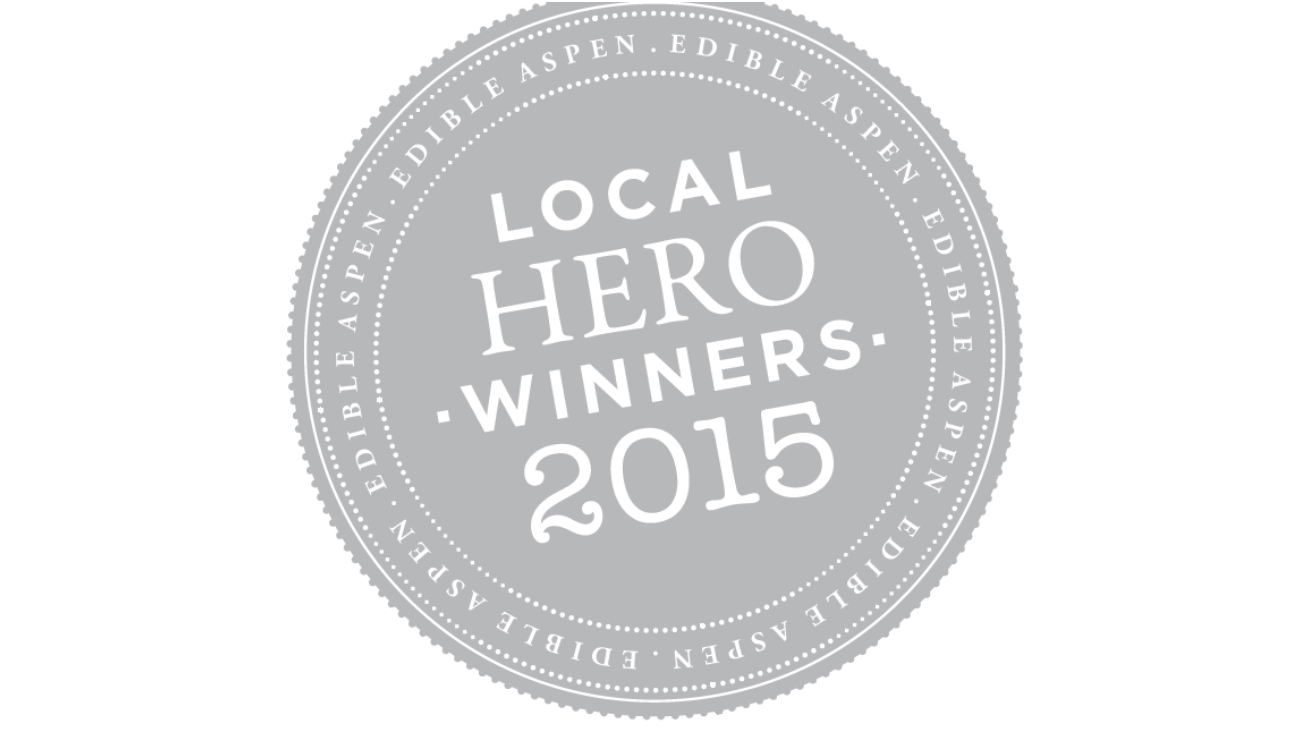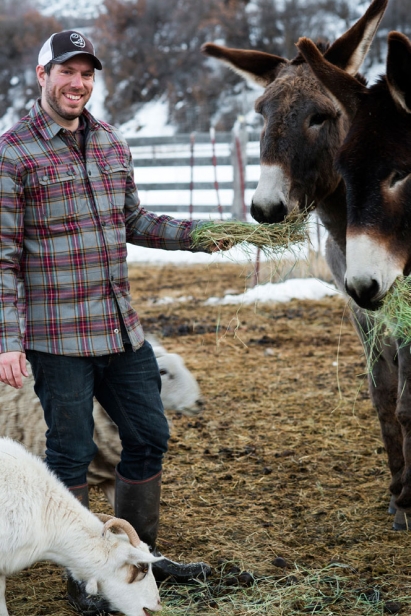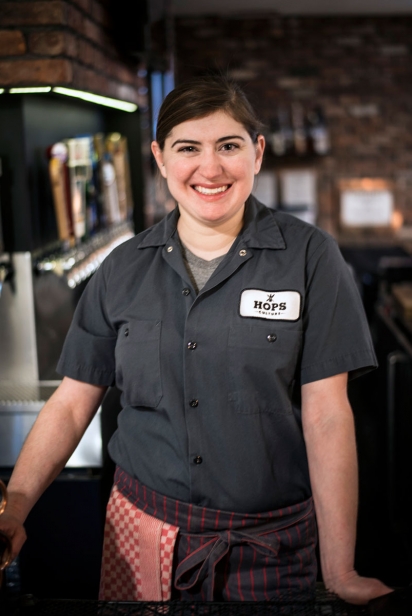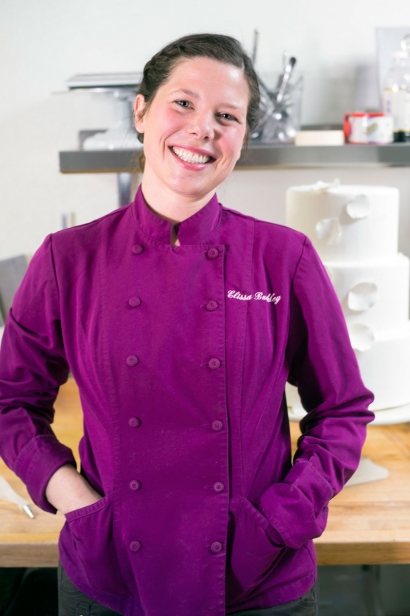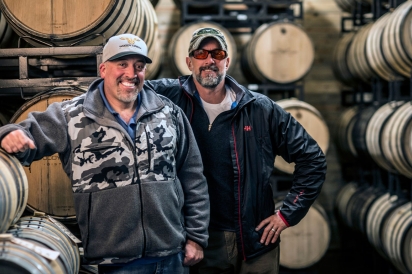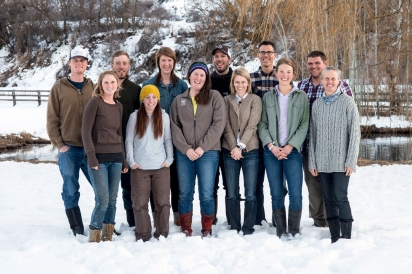Edible Aspen's 2015 Local Hero Winners
The growing businesses, visionary chefs and dedicated farmers, artisans and educators who are helping our food scene thrive
Every year, our readers vote online to nominate six noteworthy local food change-makers, and we profile the winners in these pages. These inspiring stories give us a firsthand look at what one dedicated farmer can accomplish in a few short years, at what happens when a chef is allowed to execute their vision or at how quickly a local food business can grow from a shoestring operation into a thriving success. We write these profiles to convey the remarkable energy, ambition and vision of those in the vanguard of our local food movement.
Enjoy this year’s crop of edibleASPEN Local Heroes!
FARM/FARMER
Jason Smith, Rock Bottom Ranch
After just two years at the helm of Rock Bottom Ranch in Emma, Jason Smith has accomplished enough to please a man with 10 times his tenure.
Smith and his staff have boosted both chicken and heritage pork production at the ranch, while introducing a rotational grazing regime and achieving “Animal Welfare Approved” status for the animals there. They’ve built two hoop-houses for year round vegetable production, sold their wares at the Aspen and Basalt farmers’ markets, and crowdfunded the construction of a commercial kitchen on the ranch where cooking demonstrations are now held. They’ve founded and hosted a wildly popular series of farm-to-table dinners marrying premium regional produce with the talents of local chefs, and they’ve been tireless advocates for—and architects of—emerging programs to lease county-owned open space land for agricultural production.
On top of all that, Smith has become a regular contributor to this magazine, giving readers an inside look at what it takes to run a farm in the Roaring Fork Valley.
Yet Smith says his work won’t be finished until local food becomes prominent and affordable enough in the Valley for even low-income families to enjoy it.
“There’s just not enough competition in the local food economy, and that’s keeping prices high,” he says. “Locally grown food in this valley is still a luxury, and that needs to change.”
To that end, Smith and his colleagues at ACES may turn their new commercial kitchen into an incubator for small local food businesses, and may even expand their summer farm apprenticeship program into a full-fledged farmer-training academy.
“Our big thing is trying to create scalable replicable models, and provide training for people to be able to grow food in their own backyard,” says Smith. “Surprisingly, there’s actually lots of land and opportunity out there, but we don’t have many people with the knowledge and education to carry off a small farm business.” Count on Smith to work to change that.
CHEF/RESTAURANT
Sarah Helsley, HOPS Culture
If Sarah Helsley doesn’t overhaul the menu at Aspen’s HOPS Culture restaurant every few months, it’s not because she’s opposed to cooking seasonally. It’s just that everything she serves, from pretzel bites with beer cheese dip to daily specials like St. Louis ribs, tastes good year-round.
“People keep coming back for their favorites,” says Helsley, who launched HOPS Culture with owner Bill Guth in May 2014. Helsley insists that her whole team—including General Manager Scott McKinney and Sous-Chef Zach Deauchesne— deserve credit for the restaurant’s early success, although HOPS Culture’s popular après-ski specials and a picturesque patio on the Hyman Avenue mall can’t hurt.
Virtually everything on Helsley’s comfort-centric menu is made from scratch (even the pretzel dough comes from Louis Swiss Pastry nearby) and Helsley’s central goal is to complement HOPS Culture’s staggering selection of 200 beers from around the world. Although she doesn’t get fussy about specific beer/ food pairings, the vast slate of beers available makes it certain that every diner will find something to accent their meal.
“The way specific dishes pair well with beer wasn’t something we were too concerned about,” says Helsley, who came to HOPS Culture after six years at The Little Nell, two years of owning and operating The Cheese Shop and plenty of private catering. “We have so many styles of beer that our food is bound to pair well with some of them, and we don’t want to be pretentious. We don’t want to tell people, ‘This is right, this is wrong.’ There’s no right and wrong when it comes to taste.”
FOOD ARTISAN
d’Elissious Cake Studio
An artistic rendering of Aspen Mountain, a reproduction of the X Games half pipe, an ornately decorated pair of cowboy boots or a rainbow trout reaching for the hook—even if they weren’t delectable confections, Elissa Buckley’s cakes would stand on their own as works of art.
For the last six years, Buckley has combined her notable baking talents with an artist’s eye to help locals and visitors alike celebrate their special occasions in style. Her custom wedding cakes often seem to defy both convention and gravity, an effect she credits to the occasional and strategic use of Rice Krispies treats.
“When things are really defying gravity, sometimes they’re made of Rice Krispies,” she says. “But usually its buttercream and fondant icing that hold the cakes in place. Even as a kid I always loved art class, and wedding cakes are the perfect blend of baking and artistry.”
The baking bug first bit Buckley as a young girl when she learned to make pies with her mother. Yet before long—and much to her mother’s chagrin—Buckley was going off script, tweaking recipes to suit her own young palate. Most often she added butter, a strategy that continues to serve her today.
Buckley’s wedding cake business is booming, and for the last four years she’s also maintained a booth at the El Jebel Winter Market, now housed in the greenhouse at Eagle Crest Nursery. Although she’s lately been busy raising her son Finnegan, she eventually plans to open a café and bakery somewhere in the Roaring Fork Valley.
“Many of my wedding cake clients are more affluent, but I like the farmers’ market because everyone can afford a scone, a doughnut or a cookie,” she says. “I also love seeing people’s reactions to what I make, so I’d love to have a bakery to see more of my community.”
BEVERAGE ARTISAN
Woody Creek Distillers
If you’re going to make vodka that truly tastes like vodka— rather than like rubbing alcohol or whatever it happens to be mixed with—then fresh-dug, locally grown potatoes are a great place to start.
Pat Scanlan and Mark Kleckner founded Woody Creek Distillers on that assumption in 2012, and their success since then suggests that the men were onto something. After digging roughly a million pounds of potatoes from Scanlan’s farm in Woody Creek last fall, the company will ship about 25,000 cases of vodka from its Basalt distillery this year. Both its signature vodka made from Rio Grande potatoes and a reserve brand made with Polish Stobrawa potatoes have recently won gold medals from the prestigious Beverage Tasting Institute, along with numerous other awards. And the product is now distributed throughout Colorado and 10 other U.S. states, with distribution in Texas and California slated to start in 2015.
Its meteoric growth notwithstanding, Woody Creek Distillery remains committed to processing potatoes within a day of harvest, and that means production at the distillery rises and falls with the seasons. From the start of potato harvest in September through November, vodka production runs practically round the clock. When workers pull each potato crop they plant rye as a cover crop in its place, replenishing the soil and yielding an essential ingredient in another emerging Woody Creek Distillers product: rye whiskey.
“Our 100 percent rye whiskey is drinking extremely well, and we released our first run of it in November 2014,” says Kleckner, noting that the distillery plans to ship about 1,000 cases of that whiskey every quarter in 2015. “We’re also making bourbon (corn whiskey) but that takes four to five years to come around. I’d like to say another two to three years and it will be ready.”
After much research and development, the arrival of a Woody Creek Distillers gin is also expected this spring.
“Typically, London dry gins are very juniper and citrus forward, while new-age gins like Hendrick’s have more unique botanicals,” he says. “We found one that splits the difference. We’ve done expert tastings and blind tastings and we think it’s fantastic.”
FOOD SHOP
Meat & Cheese
When it comes to grocery stores, the farm shop that occupies part of Wendy Mitchell’s new Aspen restaurant Meat & Cheese is anything but typical. For Mitchell, that’s exactly the point.
“We try to work with producers who are doing something special,” says Mitchell. “Everything in the market has to be delicious, and I have tried everything on that shelf.”
Whether it’s fresh-milled Hayden Mills flour from Arizona or sustainably caught Ortiz white tuna, Mitchell will vouch for the uniqueness of everything that’s stacked in her floor-to-ceiling inventory. It’s a confident stance for someone who’s never run a retail shop before: Although she had a successful chain of Texas restaurants and continues to own and manage Basalt’s beloved Avalanche Cheese Company (plus a Paonia goat dairy that provides Avalanche’s milk), the Meat & Cheese farm shop is Mitchell’s first foray into the retail world.
“Like anything you don’t know well, it’s been a lot of figuring things out,” Mitchell says. “I mean, for instance, how much caviar will people buy? It’s hard to tell. Or every single week we fill up the cheese case thinking it will last. Three days later, we’re asking ‘Where did all the cheese go?’”
For all the guesswork and uncertainty, Mitchell has an edge that most grocery stores lack: Meat & Cheese also houses a popular restaurant whose cooks will use any fresh food the shop doesn’t sell.
“We feature things in our prepared dishes that we sell at the market, and the things we don’t sell, we can cook,” Mitchell says.
That fallback option gives Mitchell valuable peace of mind, a feeling she hopes to share with other area food producers this summer by making the farm shop an outlet for unsold or extra produce.
“Once we get into the growing season, we’ll have a produce stand set up outside, so it will be a farmers’ market look all the time,” she says. We’ll bring extra produce over from Paonia farmers with our milk deliveries, and if farmers at the Aspen market don’t sell everything, they can leave it with us!”
NONPROFIT
Aspen Center for Environmental Studies
The barnyard is a far cry from your typical elementary school classroom. Yet the teachers at the Aspen Center for Environmental Studies (ACES) know that there are plenty of lessons to be learned on the farm, and they can even be shaped to meet statewide educational standards.
Just ask ACES Education Director Arin Trook, whose team of 10 educators has devised a host of creative ways to square on-farm learning with state requirements. ACES teachers help kindergarteners sort fingerling potatoes to learn about categorization. They take first-graders out to visit newborn calves and piglets for hands-on genetics lessons. And they lead fourth-graders through classroom exercises comparing the embedded energy in local apples to that of imported bananas.
Whatever the exercise, Trook and his teachers strive to give students the tools to lead more sustainable lives.
“We try to help students become ecological citizens who can put these things into action every day,” says Trook. “ACES has put quite a bit more emphasis on sustainable agriculture in recent years, and I’ve been trying to integrate that into our education curriculum.”
Between its headquarters at Hallam Lake in Aspen and Rock Bottom Ranch in Emma, ACES hosts educational programs for roughly 50 local schools each year; students come from as far afield as Eagle and Rifle. The nonprofit also pays for full-time science teachers in the Aspen, Basalt and Carbondale elementary schools, hosts a weekly agricultural education program for preschoolers and their parents and runs a summer farm apprenticeship at Rock Bottom Ranch for local high school students.
“Food and agriculture are such wonderful vehicles for education,” says Trook. “What we’re trying to do here at ACES is not just fill up people’s minds, but get them to change the patterns and habits of their daily lives.”
NOMINATE YOUR FAVORITE LOCAL HEROES
for next year’s awards starting in September. Watch for an announcement and instructions on how to vote in our Fall issue.


